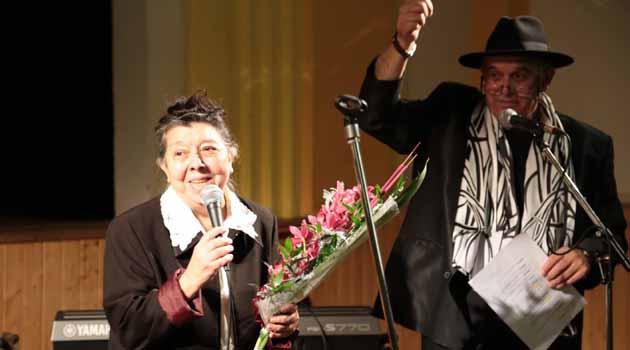Czech Republic: 2016 Prize of the Museum of Romani Culture goes to Margita Lázoková

The Prize of the Museum of Romani Culture, given annually to an eminent figure whose work has contributed to the development, preservation and promotion of Romani culture, was won this year by Margita Lázoková. The ninth annual awards ceremony took place last week as part of a musical evening commemorating Czechoslovakia’s very first Romfest 1990.
The ceremony was augmented by performances from top Romani musicians such as violinist Marián Balog and Zdeněk Lázok, the band Le Čhavendar from Rokycany, and Milan Horváth’s Cembalom Ensemble. “We awarded the prize to Ms Margita Lázoková for her years of collaboration with the Museum of Romani Culture and for her activities in the field of Romani emancipation, which date from the time of the Union of Gypsies-Roma,” said the director of the Museum of Romani Culture, Jana Horváthová.
“This award is also for her cultivation and dissemination of the Romanes language and for her presentations at public events such as commemorative ceremonies and evenings or exhibitions.,” the director said. Lázoková comes from a musical family in Slovakia.
She began her working life as a waitress in the Hotel Morava in Brno, Czech Republic and was then asked to work at the luxurious restaurant Bohéma, where she spent 15 years. Her professional work involves her love of cooking, whether classic, traditional Romani cuisine or other world cuisines.
Lázoková has also been engaged in Romani emancipation efforts. From the beginning of her time in Brno she participated in the establishment of the Union of Gypsies-Roma, where she was an active member beginning in 1969.
After 1989 she was involved in the activities of the Roma Civic Initiative and contributed to the activities of the Brno City Hall. At that time she began to dedicate herself to education work with Romani youth as the occasion arose, especially involving teaching the Romanes language.
PREVIOUS FIGURES AWARDED THE PRIZE OF THE MUSEUM OF ROMANI CULTURE
2009 – Jana Šustová. Prize awarded for her assiduous aid to the Musuem and constant support in creating its collections and promoting Romani culture in general.
2010 – Ján Sajko. Prize awarded for his sustaining energy and significantly above-standard work with Romani pupils, international promotion of their artwork, and exemplary collaboration with the Museum of Romani Culture.
2011 – Ctibor Nečas. Prize awarded for many years of collaboration with the Museum of Romani Culture, provision of expert advice and consultations, and for aid in expanding the Museum’s collections.
2011 – Karel Holomek. Prize awarded for many years of tireless work on behalf of ethnic Romani people and for the significant role he played in establishing and building up the Museum of Romani Culture.
2012 – Eva Davidová. Prize awarded for many years of tireless work on behalf of ethnic Romani people and for the significant role he played in establishing and building up the Museum of Romani Culture.
2013 – Emílie Machálková. Prize awarded for many years of collaboration with the Museum, based primarily on sharing her lifelong experience of working with children and youth in the schools.
2014 – Eugen Horváth in memoriam. Prize awarded for lifelong dedication to Romani culture, cultivation of the Romani musical tradition and representation of it, for exceptional musicianship, and for many years of collaboration with the Museum of Romani Culture.
2015 – Ignác Zíma. Prize awarded for many years of collaboration with the Museum of Romani Culture, especially care for the development and preservation fo the Romani language and other areas of traditional culture, as well as for sharing his historical awareness with the next generation.
2016 – Margita Lázoková. Prize awarded for many years of collaboration with the Museum of Romani Culture, for her activities in the field of Romani emancipation, which date from the time of the Union of Gypsies-Roma, and her presentations at public events such as commemorative ceremonies and evenings or exhibitions.
